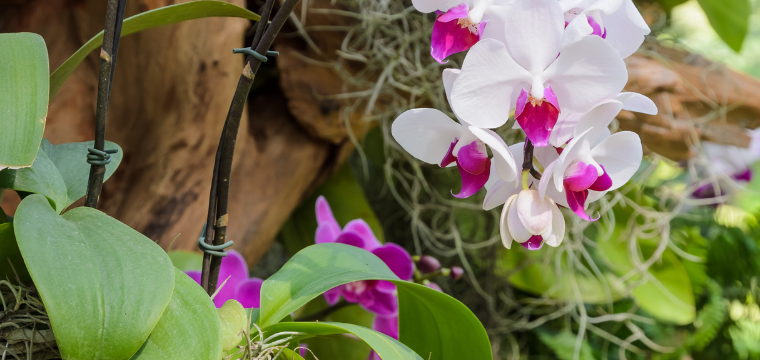
Program Details
Friday, January 31, 2025
Orchids: Colorburst exhibition Preview | 5 – 6:30
Lecture by Nisa Karimi, Missouri Botanical Garden Scientist | 6:30 – 7:30 pm
Join us for an exclusive preview of the Orchids: Colorburst exhibition on the evening of January 31, 2025. Complimentary access to the exhibit will be followed by a lecture by Nisa Karimi of the Missouri Botanical Garden. Orchids: Colorburst is a statement of bold and bright colors, geometrical shapes, suspended blooms, and playful interactions of color and light. The exhibition also marks the unveiling of artist Kat Cadena’s mural entitled Edmond Albius and the Vanilla Orchid.
While many collect and care for orchids because of their exotic colorful flowers, their incredible diversity and intricate pollination biology is sure to inspire another level of awe! Orchids are one of the most species-rich plant families on earth. Many have evolved bright colors to attract certain pollinators, some smell like insects in order to deceive them into being pollinated, almost all require specific fungi for their seeds to germinate and grow. Missouri Botanical Garden Scientist Nisa Karimi will introduce us to the incredible diversity of orchids and their amazing biology – highlighting species found from Texas to the Andean Cloud Forests.
Fee: Free, registration required
About the speaker: Nisa Karimi is a Scientist at the Missouri Botanical Garden in the Science and Conservation Division. Broadly, her research questions explore how the incredible diversity of plants on earth have evolved and interact with their environment. To understand patterns of biodiversity, she employs a variety of approaches (from traditional taxonomy and systematics to pollination ecology), to investigate evolutionary and ecological factors that generate organismal diversity across varying temporal and spatial scales. She holds a PhD from the University of Wisconsin – Madison’s Department of Botany where she studied the evolutionary history and pollination biology of the baobab trees of Africa and Madagascar. Prior to receiving her doctorate degree, she worked as a land manager for over a decade focusing both on invasive species management and ecological restoration. Because of this background, her research aims to bridge science with application – using science to best inform biodiversity conservation action plans.